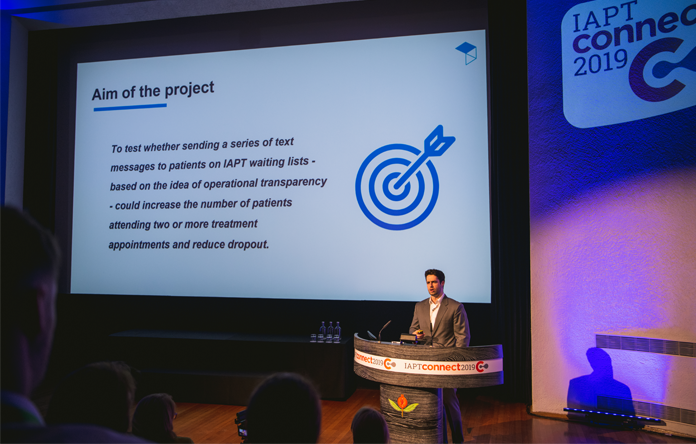
We were very pleased to welcome Hugo Harper from the Behavioural Insights Team (BIT) to the stage at IAPT Connect 19.
Hugo shared the results of a project run in partnership with Mayden and the Cabinet Office and seven IAPT service providers, to test whether sending a series of text messages to patients on IAPT waiting lists could increase patient engagement.
Hugo is Head of Health at BIT – a social purpose company at the intersection of psychology and economics, dedicated to the application of behavioural sciences to inform policy, improve public services and deliver results for citizens and society.
At the event, Hugo described how of the 1.4 million people referred to IAPT in 2017/18, almost two in three people did not complete a course of treatment. Because of the volume of demand, many people wait weeks or months to begin treatment with very little contact or communication from services. In the services that participated in this project, 45% of patients were dropping out before their second appointment.
Hugo explained that some of these dropouts are valid – people begin feeling better, for example. But in many cases, individuals who drop out would benefit from treatment.
Aims of the project
This project aimed to test whether sending a series of text messages to patients on IAPT waiting lists could increase the number of patients attending two or more treatment appointments and reduce dropout. The wording of the texts provided operational transparency – the idea of this is to help individuals to understand how the service works behind the scenes.
BIT designed a series of text messages to provide patients with regular updates from services, reassuring them that the service was working to keep the patient moving along the waiting list. You can see the content of each of these text messages in Hugo’s slides, available as a download to members of our LinkedIn group.
Results
The trial found that patients who received the text messages were significantly more likely to attend two or more treatment appointments than those that did not, and were less likely to drop out. While there was no detectable improvements in mental health outcomes, the intervention has increased attendance at therapy sessions which should in turn improve patient outcomes.
The trial also found that people who self refer are more likely to attend two or more treatment appointments, compared to those referred by a GP (50.8% vs 47.6%). In addition, it found that people aged 31 to 50 (50%) and those aged 51 and over (57%) are more likely to attend two or more treatment appointments compared to those aged up to 30 (46.7%). Read more about the results in this blog by BIT.
Potential for scale up
Hugo explained that the the use of text messaging is a low cost intervention with great potential to be scaled up and automated. Whilst the percentage improvements appear small at this scale, when an intervention like this is applied at scale, it can impact thousands of patients.
To watch Hugo’s presentation in full and download his slides, please join the IAPT Connect 19 group on LinkedIn. And don’t miss The Mental Elf podcast interview with Hugo, recorded live at IAPT Connect 19.

